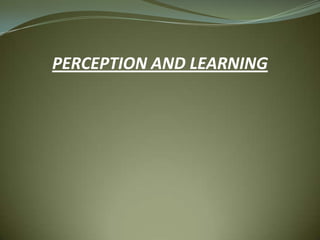
Perception and learning in Organization
- 2. PERCEPTION What you get from this picture.?? Different people understood same things differently. This occurs due to perception.
- 3. PERCEPTION DEFINITION Oxford defines perception as “receiving, collecting, action of taking possession, apprehension with the mind or senses.” Simply, “it is the process of attaining awareness or understanding of the environment by organizing and interpreting sensory information.”
- 4. Attitudes and Behavior Organization and Interpretation Selective Attention PERCEPTUAL PROCESS MODEL Feeling Hearing Seeing Smelling Tasting Environmental Stimuli
- 5. FEATURES OF PERCEPTION It is an intellectual process. It is a process of becoming aware of situations. It is a psychological process. It differs from person to person.
- 7. PERCEPTION PROCESS. Receiving stimuli. Selection of stimuli. Organisation of stimuli. Interpretation of stimuli.
- 8. FACTORS INFLUENCING PERCEPTION. INTERNAL FACTORS: Learning. Needs. Age difference. Interest. Experience. Personality. Belief. EXTERNAL FACTORS: Nature . Location. Intensity. Size. Contrast. Movement. Repetition. Novelty and familiarity.
- 10. Learning is another important variable of human behaviour. Learning is a term frequently used by the people in a wide variety of contexts. It is a continuous process. It occurs all the time. LEARNING
- 11. DEFINITIONS E. R Hilgard defines learning as “a permanent change in behaviour that occurs as a result of prior experience”. Mitchel has defined learning is “the process by which new behaviour are acquired”.
- 12. So it seen that all are generally agreed, learning involves changes in behaviour, practicing new behaviour and establishing permanency in the change.
- 13. Features of Learning Learning involves change in behaviour. This change in behaviour may not be necessarily being an improvement over previous behaviour. This change may be good or bad from an organizational point of view.
- 14. The change must be relatively permanent Temporary changes may be only reflective and fail to represent experience. Learning is reflected in behaviour. The behavioural change must be based on some form of practical experience.
- 15. The practice of experience must be reinforced in order for learning to occur. Learning occurs through out one’s life.
- 16. Steps in Learning Process Input There should be a stimulus which is clearer to the learner. Without a stimulus, learning does not take place.
- 17. Response The stimulus results in responses. Responses may be physical from or may be in terms of attitudes, familiarity, perception or other complex phenomena. A person should be encouraged and allowed to practice the performance response.
- 18. Motivation There must be a motivation or drive before there can be any learning. Motivation is something that moves a person to action, and continues him in the course of action already initiated. It includes interest and the attitude to learn. He is likely to learn even though he possesses adequate capacity to learn and understands what is being taught.
- 19. Reinforcement It is the fundamental condition of learning. Reinforcement in learning is some type of reward following the performance of an activity that leads to the likely hood of the activity being performed again. If a person is not rewarded or does not perceive the like of the reward in near future, he stops learning.
- 21. THEORIES OF LEARNING Learning is the acquisition of new behaviour. People acquire new behaviour frequently. A number of theories of learning are so far developed. These theories can be grouped in three categories. They are conditioning theory, Cognitive theory and Social learning theory.
- 22. 1) Conditioning Theory Conditioning has two main theories; 1. Classical conditioning 2. Operant conditioning.
- 23. a) Classical Conditioning Classical conditioning states that behaviour which is learned by repetitive association between a stimulus and a response. Classical conditioning through offers explanation for learning, fails to explain total behaviour. Certain psychologists mention classical conditioning is passive.
- 24. b) Operant Conditioning Operant can be defined as behaviour that produces effects. Operant conditioning acts on environment to produces consequences. It is basically assumed that man’s behaviour is determined by environment and individual learn by producing alteration in their environment. Operant conditioning presupposes that human being explore their environment and act upon it.
- 25. 2) Cognitive Theory of Learning Cognitive theory is very much alive and relevant today. It refers to an individual’s ideas, thoughts’ knowledge, interpretations, and understanding about him and his environment. This theory was developed by Tolman. This theory assumes that the organism learns the meaning of various objects and events and learned responses depend upon the meaning assigned to stimuli.
- 26. 3) Social Learning Theory Cognitive theory is very much alive and relevant today. It refers to an individual’s ideas, thoughts’ knowledge, interpretations, and understanding about him and his environment. This theory was developed by Tolman. This theory assumes that the organism learns the meaning of various objects and events and learned responses depend upon the meaning assigned to stimuli. Social learning theory stresses upon the ability of an individual to learn by observing model-parents, teachers, motion pictures, T.V artists, bosses and others. Many pattern of behaviour are watching the behaviour of others and observes its consequences for them.
